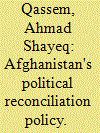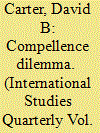| Srl | Item |
| 1 |
ID:
133602


|
|
|
|
|
| Publication |
2014.
|
| Summary/Abstract |
The Afghan government's peace and reconciliation overtures to the militants, initially at the unofficial level but later sanctioned officially, have formed a key theme of state security policy from the early days of the post-Taliban administration in Afghanistan. Yet far from producing peace and stability, they seem to have played into the hands of the violent groups intent on overthrowing the country's internationally supported and legitimate political system in the past decade. There is no doubt about the importance of national reconciliation as a wider process of overcoming the legacy of beleaguered social relationships and forging a common vision for the future among all Afghans, but the nature of the government's reconciliation policy, which borders on appeasement of the militants, seems so far to have created more vulnerabilities than strengths in the face of increasingly emboldened anti-state violent groups.
|
|
|
|
|
|
|
|
|
|
|
|
|
|
|
|
| 2 |
ID:
141846


|
|
|
|
|
| Summary/Abstract |
This article introduces the idea of a compellence dilemma. This dilemma arises when the domestic policies of adversaries—such as hosting violent groups—threaten states’ security. Such states often consider coercive instruments to compel their adversary to change those policies. The problem? The prospect of costly punishment makes cooperation more attractive for the adversary. However, if they fail to coerce policy change, harsh punishments can reduce the adversary's capacity to enact policy change and induce harmful domestic instability. These problems are compounded by the fact that both the threatened states’ incentive to use costly punishments and the costs of failed compellence increase with the severity of the security threat. The logic of the compellence dilemma applies whenever a state uses damaging coercive instruments but risks failing to achieve its immediate objectives. I analyze the compellence dilemma with a dynamic game-theoretic model of interaction among a target state, host state, and violent group, and show that it is pervasive in equilibrium. I show that the compellence dilemma causes states to refrain from using harsh punishments even when they would compel the host state to cooperate. Concerns about decreasing future host-state capacity and increasing group power drive this result.
|
|
|
|
|
|
|
|
|
|
|
|
|
|
|
|
| 3 |
ID:
091895


|
|
|
|
|
| Publication |
2009.
|
| Summary/Abstract |
Born form the remains of the Gulf Cartel and Zetas, La Familia has grown into Mexico's most violent criminal organisation. Here author charts the group's development and expansion and the consequences this could have for regional security within the region.
|
|
|
|
|
|
|
|
|
|
|
|
|
|
|
|